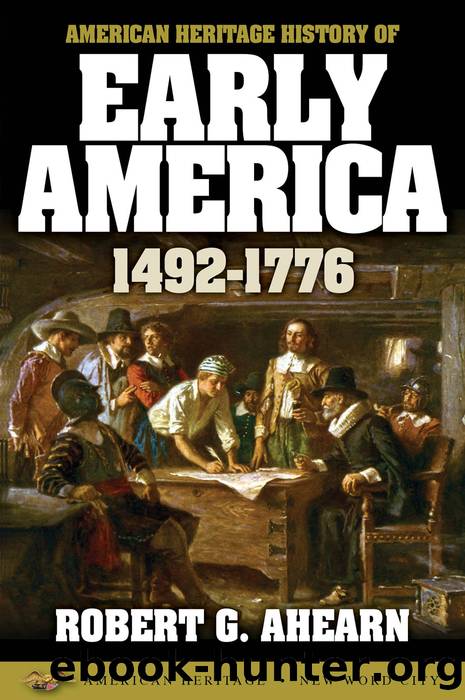American Heritage History of Early America by Robert G. Ahearn

Author:Robert G. Ahearn [American Heritage History of Early America: 1492-1776]
Language: eng
Format: epub
Tags: History/United States/Colonial Period
ISBN: 9781612309408
Publisher: New Word City, Inc.
Published: 2016-01-26T16:00:00+00:00
When the sounds of cannonading in the Seven Years War died away, there was revealed along the Atlantic seaboard a new nationality. For more than a century an American strain had been developing, so imperceptibly that many in America as well as the Old World were unaware of it. Only when England tried to exercise increased control did the colonists realize that an individual society, ready to demand more freedom, had arisen. The war itself had not only awakened them to their potentialities, but its result had freed them from fear of the French and Spanish. Only the Indians stood between them and unlimited expansion. It is little wonder that they began to flex their biceps and assert themselves. In some respects, the American Revolution had started.
For some years, England’s tightening restrictions had annoyed the colonists. To strike out at its commercial rivals, England had introduced a series of laws known as the Navigation Acts. They conformed to the prevailing economic theory of Europe called mercantilism. Commercially active Continental countries acquired as much bullion as possible through trade, particularly with their own colonies, over which they had complete control. They strengthened themselves with this treasure and often used it to finance wars against their neighbors. It was with the same idea of making their empire self-sufficient that the British turned toward mercantilism.
The first act, passed in 1650, was designed primarily to curb the Dutch, who had captured a large portion of the carrying trade. All foreign vessels were forbidden to trade with the English colonies. Within a year, the law was tightened to force goods from the colonies into English vessels only. Ten years later, in 1660, and again in 1663, additional provisions stated that not only were all foreign merchants excluded from the English colonies, but certain “enumerated” goods, like sugar, cotton, indigo, and tobacco, must be transported to England before they could be sold elsewhere. By a law of 1673, ships bound for England from the colonies, bearing any of the enumerated goods, were required to post a bond to insure delivery of the goods in an English port as promised. The law also required that duties be paid at the point of shipment. These acts were crowned by the statute of 1696, which tightened the existing laws to the extreme. Henceforth no colonial goods might be carried from one colony to another except in English-built ships. Governors were threatened with heavy fines for allowing infractions, and any colonial laws that conflicted with the act were declared null and void. The better to enforce its edict, the English government now separated the American colonies into two admiralty divisions and appointed judges to each to deal with violators. This final attempt must have been effective, for at once, trade between the colonies and England soared.
The Navigation Acts, although aimed at the Dutch, also assured English traders a monopoly in America. The Northern colonies were those most interested in trade, and they welcomed the acts of 1650-51, for the Dutch were their chief competitors.
Download
This site does not store any files on its server. We only index and link to content provided by other sites. Please contact the content providers to delete copyright contents if any and email us, we'll remove relevant links or contents immediately.
| Africa | Americas |
| Arctic & Antarctica | Asia |
| Australia & Oceania | Europe |
| Middle East | Russia |
| United States | World |
| Ancient Civilizations | Military |
| Historical Study & Educational Resources |
Making Haste From Babylon(719)
New York Burning by Jill Lepore(624)
An Inquiry Into the Nature and Causes of the Wealth of Nations by Adam Smith(600)
Braddock's March by Thomas E. Crocker(595)
Bunker Hill by Nathaniel Philbrick(585)
The Barbarous Years by Bernard Bailyn(483)
Commonwealth Caribbean Criminal Practice and Procedure by Dana S. Seetahal(473)
America's Revolutionary Mind by C. Bradley Thompson;(460)
John Adams Under Fire: The Founding Father's Fight for Justice in the Boston Massacre Murder Trial by Dan Abrams(456)
Bunker Hill: A City, a Siege, a Revolution by Nathaniel Philbrick(455)
American Slavery: A Very Short Introduction (Very Short Introductions) by Heather Andrea Williams(436)
Infamous Scribblers by Eric Burns(435)
A Land So Strange: The Epic Journey of Cabeza de Vaca by Andre Resendez(434)
The Wealth of Nations Books I-III by Adam Smith(432)
The City-State of Boston by Mark Peterson(428)
White Slavery In Colonial America: And Other Documented Facts Supressed from the Public Know! by Dee Masterson(424)
The Barbarous Years: The Peopling of British North America: The Conflict of Civilizations, 1600-1675 by Bernard Bailyn(420)
The First American by H.W. Brands(392)
George Washington by John Rhodehamel(380)
